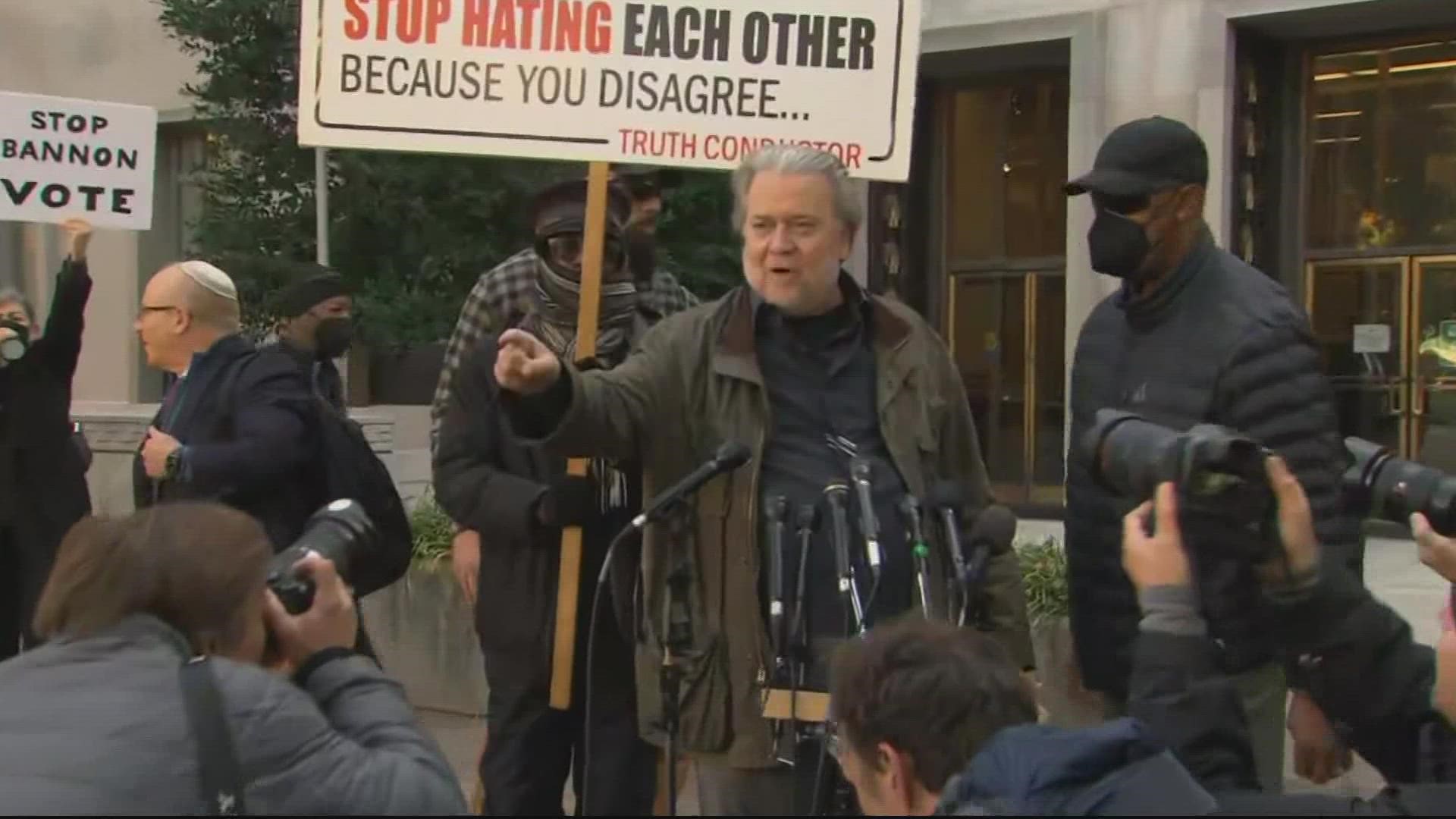WASHINGTON — A federal appeals court panel appeared skeptical Thursday as an attorney for former White House adviser Steve Bannon argued his conviction for defying a subpoena from the January 6th Committee should be overturned.
Bannon, who served as the CEO of former President Donald Trump’s 2016 presidential campaign and then for a brief time as senior counsel to the president, was convicted by a jury last year on two counts of contempt of Congress. He was sentenced last October to four months in prison, but allowed to remain free on bond while he appeals his conviction.
Bannon was represented at trial by attorneys David Schoen, who helped represent Trump during his second impeachment trial, and Evan Corcoran, a former U.S. attorney who both represented Trump during the investigation stage of what became the Mar-a-Lago classified documents case and could become a key government witness at trial. On Thursday, Schoen argued before a three-judge panel of the D.C. Circuit that Bannon should have been allowed to tell jurors he was relying on the advice of a third lawyer, Robert Costello, when he failed to provide documents or testimony on more than a dozen subjects requested by the January 6th Committee.
PREVIOUS
At the heart of Schoen’s appeal is a 1961 D.C. Circuit Court decision in Licavoli v. United States – a contempt of Congress case involving former Detroit mobster Peter Licavoli – that held advice of counsel was not a legitimate defense to failing to respond to a Congressional subpoena. Schoen has argued throughout the case that Bannon was told by Costello that Trump had asserted executive privilege and that he therefore could not comply with the subpoena.
“Mr. Bannon acted in the only way he believed, and understood from his lawyer, the law allowed him to behave,” Schoen said.
Under federal law, appellate panels are generally bound by the decisions of previous panels on the same subject, although the full court can overturn previous decisions in what’s known as an en banc hearing. The Justice Department argued U.S. District Judge Carl Nichols had ruled correctly when he barred Bannon from advice of counsel and other defenses, the panel was bound by the Licavoli ruling and that Bannon’s other arguments for a new trial – among them that he was blocked from subpoenaing January 6th Committee Chairman Rep. Bennie Thompson (D-MS) – were unpersuasive.
The case was heard by a panel of Judges Justin Walker, Cornelia Pillard and Bradley Garcia. Each in turn questioned Schoen about whether his arguments held up to scrutiny – and suggested they did not.
Pillard, who was nominated to the federal bench in 2013 by former President Barack Obama, pressed Schoen on his claim that, because Thompson and the committee had attempted to get Bannon to comply with the subpoena even after voting to hold him in contempt, the dates should be seen as flexible and non-binding.
“There’s all kinds of thing where there are consequences for missing a deadline… but the duty persists,” Pillard said, specifically mentioning taxes.
Garcia, who was nominated to the court last year by President Joe Biden, noted Bannon, through Costello, had received a letter from Trump attorney Justin Clark specifically saying the former president didn’t believe he had immunity from testifying. In an interview with the FBI, Clark said Trump had “never invoked executive privilege over any particular information or materials” with respect to Bannon and that Trump’s letter to him “provided no basis for total noncompliance.”
Walker, a 2019 nominee of Trump, was more direct, telling a prosecutor he believed the DOJ was “probably” right that Nichols had correctly barred the defenses in Bannon’s trial under D.C. Circuit law.
Outside of court, Schoen told reporters he was already contemplating requesting a rehearing before the entire D.C. Circuit and that he thought they might eventually have to go to the Supreme Court.
Bannon, who was not at the hearing Thursday, is currently set to begin trial in New York May on money laundering, conspiracy and fraud charges related to a scheme that raised more than $25 million from donors to build a wall along the border of U.S. and Mexico. He avoided federal charges that ensnared three other men involved in the We Build the Wall campaign thanks to a pardon from Trump, but was indicted on state charges by a New York grand jury last year. Brian Kolfage, a U.S. Air Force veteran who helped found the organization, was sentenced in April to four years in prison after pleading guilty in connection with the scheme. A second defendant, Andrew Badolato, also pleaded guilty and was sentenced to three years in prison. Timothy Shea, a third defendant in the case, was convicted at trial and was sentenced in July to more than five years in prison.

